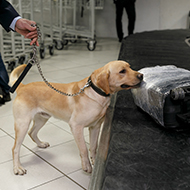
The 'dog squad' will sniff out products of animal origin.
A new 'dog squad' of detector dogs has been formed in Scotland to sniff out products of animal origin (PoAO) and stop the importation of exotic animal diseases.
The dogs will be based full time at airports, ports and parcel hubs across Scotland, and have been funded by the Scottish government.
Mairi Gougeon, rural affairs secretary for Scotland, said: “The Scottish Government and Border Force have worked closely to get the dogs operational in Scotland.
“Alongside their handlers, they have taken part in a robust training regime and now that they have passed their assessments they can get to work and help us detect PoAO entering Scotland illegally.
“The Scottish Government investment in our new detector dog service will enhance the detection of illegal products of animal origin and reduce the risk of exotic diseases entering Scotland, thus helping to keep our rural economy safe.
“Monthly seizure data provided by Border Force North helps us ascertain where PoAO originate from and helps us identify periods where seizures are above average.”



 The Veterinary Medicines Directorate (VMD) is inviting applications from veterinary students to attend a one-week extramural studies (EMS) placement in July 2026.
The Veterinary Medicines Directorate (VMD) is inviting applications from veterinary students to attend a one-week extramural studies (EMS) placement in July 2026.